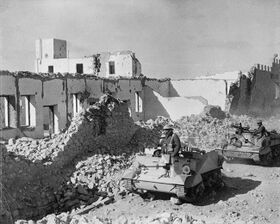Fall of 1942 Campaign
This article is incomplete because it is pending further input from participants, or it is a work-in-progress by one author. Please comment on this article's talk page to share your input, comments and questions. Note: To contribute to this article, you may need to seek help from the author(s) of this page. |
| 1942 Joyonghean Autumn Campaign | |||||||
|---|---|---|---|---|---|---|---|
| Part of the Asianna and the Pacific Campaign of the Second Europan War | |||||||
 A 25th Battalion convoy of the 8th New Akiba Division goes through Samseong-dong following Allied capture of the city by 24 November 1941. | |||||||
| |||||||
| Belligerents | |||||||
| Commanders and leaders | |||||||
| Units involved | |||||||
| |||||||
| Casualties and losses | |||||||
|
| ||||||
Fall of 1942 Campaign (18 September - 25 November 1942) was an Allied campaign that secured the southwestern regions of Joyonghea just opposite of the Pusan Region. The plan stemmed following the Battle of Kamsong, where poorly coordinated Joyonghean and Concordian forces were driven into disarray by a combined Archadio-Quenminese force. The campaign was initiated as a way to capture the vital city of Samseong-dong, one of Joyonghea's industrially important cities. The failure of the Allies to get into the city during the previous engagement at Kamsong fuelled General Okita Hanamura's resolve to help Joyonghean Grand General Cheon Sang-ji consolidate Allied control in the area.
As a result, Hanamura ordered both Generals Namgung Wook-yun and Douglas Tecumseh Stilwell to put their forces on hold to let Samegawa take his forces to clear a path. Samegawa, with the help of the SAS planned the Raids at Sarihung, which denied the enemy of several resupply depots on the outskirts of the city. The raids lasted until in 18 October, when Samegawa began his attack to take the city. Facing stiff resistance, Allied forces did not expect Imperial forces to defend the city. This culminated in a month-long battle to take the city. As a result, Samegawa planned Operation Helicon, which was an Allied operation to destroy the western Imperial flanks, cutting the city off from any chance of reinforcements.